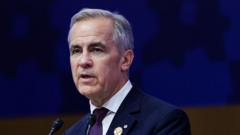Did Canadian PM Carney Just Apologize to Trump Over an Anti-Tariff Ad?

Published: 2025-11-01 15:00:08 | Category: wales
The recent diplomatic spat between Canada and the United States has escalated following Canadian Prime Minister Mark Carney's apology to President Donald Trump over an advertisement that utilised a quote from former President Ronald Reagan to criticise tariffs. This incident has raised significant tensions in trade relations between the two countries, prompting Trump to suspend trade talks and threaten further tariffs on Canadian imports.
Last updated: 25 October 2023 (BST)
What’s happening now
The situation has developed rapidly, with Prime Minister Carney publicly acknowledging his apology to President Trump during the Asia-Pacific Economic Cooperation Summit in South Korea. This comes after an advertisement funded by the Ontario province sparked outrage in the White House due to its use of Reagan’s 1987 assertion that tariffs negatively impact the American economy. Trump, who described the advertisement as "wrong", is now considering imposing an additional 10% tariff on Canadian imports, significantly straining the already complex trade relationship between the two nations.
Key takeaways
- Mark Carney apologised to Donald Trump over an anti-tariff advertisement featuring a Ronald Reagan quote.
- The advert led Trump to suspend trade talks with Canada and threaten new tariffs.
- Doug Ford, Premier of Ontario, produced the controversial advertisement, claiming it received one billion views.
Timeline: how we got here
Here’s a brief timeline of the key events leading up to the current situation:
- 1987: Ronald Reagan delivers a national radio address highlighting the negative impact of tariffs on the American economy.
- October 2023: An advertisement funded by Ontario airs during the World Series, using Reagan's quotes to criticise tariffs.
- 20 October 2023: President Trump suspends trade talks with Canada in response to the advertisement.
- 21 October 2023: Mark Carney apologises to Trump, stating the ad was "not something I would have done."
- 25 October 2023: Trump announces plans for an additional 10% tariff on Canadian goods.
What’s new vs what’s known
New today/this week
Mark Carney's public apology marks a significant diplomatic gesture in an increasingly fraught relationship. Additionally, Trump's threat of a new 10% tariff represents a potential escalation in trade hostilities.
What was already established
The existing tariffs imposed by the US on Canadian goods, including a 35% tariff on certain imports and targeted tariffs on steel, aluminium, and automobiles, have already created a challenging landscape for trade between the two nations.
Impact for the UK
Consumers and households
The implications of these trade tensions may ripple across the pond. UK consumers could see indirect effects on prices, particularly if trade disruptions increase costs for goods that originate in or pass through Canada and the US. Additionally, any significant tariffs could lead to shifts in global supply chains that might affect availability and pricing of products in the UK.
Businesses and jobs
UK businesses that rely on trade with Canada or the US may face disruptions due to the evolving tariff situation. Potential increases in import costs could lead to higher prices for consumers, affecting sales and profitability. Companies in sectors like automotive, manufacturing, and agriculture might need to reassess their supply chain strategies to mitigate risks associated with increased tariffs.
Policy and regulation
The UK government may monitor these developments closely, as any escalation in trade tensions could have broader implications for international trade agreements. Furthermore, the UK's own trade negotiations could be influenced by the outcomes of the US-Canada discussions, especially in sectors where tariffs are a concern.
Numbers that matter
- 35%: Current average tariff on Canadian goods imposed by the US.
- 10%: Proposed additional tariff on Canadian imports by Trump.
- 1 billion: Estimated views of the controversial advertisement funded by Ontario.
- 50%: Tariff on Canadian steel and aluminium products.
- 25%: Tariff on automobiles imported from Canada.
Definitions and jargon buster
- Tariff: A tax imposed by a government on goods and services imported from other countries.
- NAFTA: The North American Free Trade Agreement, a trilateral trade bloc between Canada, Mexico, and the USA.
- APEC: Asia-Pacific Economic Cooperation, a forum for 21 Pacific Rim countries that promotes free trade throughout the Asia-Pacific region.
How to think about the next steps
Near term (0–4 weeks)
In the coming weeks, businesses and consumers should stay informed about any announcements regarding tariffs. The potential for retaliatory measures from Canada or other affected nations could emerge, impacting international trade dynamics.
Medium term (1–6 months)
As the situation unfolds, it will be important to monitor the effectiveness of the current tariffs and any new measures proposed by the US. Businesses should prepare contingency plans to adjust their supply chains or pricing strategies as needed.
Signals to watch
- Statements from US and Canadian government officials regarding trade negotiations.
- Changes in tariff rates or new tariffs being proposed.
- Market reactions to trade news and their impact on stock prices, particularly in affected sectors.
Practical guidance
Do
- Stay updated on trade news and government announcements related to tariffs.
- Evaluate how changes to tariffs may affect your business or household expenses.
- Consider diversifying suppliers to mitigate risks associated with tariffs.
Don’t
- Don’t panic; understand the broader context of trade relationships.
- Don’t make hasty business decisions without thorough analysis of potential impacts.
- Don’t ignore the potential for ongoing dialogue between Canada and the US that may resolve tensions.
Checklist
- Review supply chain dependencies on Canadian imports.
- Monitor news for updates on US-Canada trade discussions.
- Assess the impact of potential tariffs on pricing strategies.
- Engage with trade associations for insights on market conditions.
- Prepare for possible shifts in consumer demand based on price changes.
Risks, caveats, and uncertainties
The situation remains fluid, with potential for miscommunication or further incidents that could exacerbate tensions. Additionally, the legal implications of tariffs on international trade are complex, and rulings from the US Supreme Court could significantly impact the landscape. Companies should remain vigilant about legal changes and be prepared for rapid shifts in the trade environment.
Bottom line
The apology from Mark Carney to Donald Trump highlights the fragility of US-Canada trade relations, which are being tested by the advertisement’s fallout. Businesses and consumers should prepare for potential changes in tariffs and trade policies that could affect pricing and supply chains in the UK and beyond.
FAQs
What was the controversial advertisement about?
The advertisement used a quote from Ronald Reagan to argue against tariffs, suggesting they harm the American economy, which offended President Trump and led to diplomatic tensions.
How has Trump responded to the situation?
Trump suspended trade talks with Canada and announced plans for an additional 10% tariff on Canadian imports, stating the advertisement was "wrong".
What are the potential implications for UK consumers?
UK consumers may face indirect effects on prices and availability of goods if trade tensions escalate, impacting supply chains that involve Canadian and US products.



